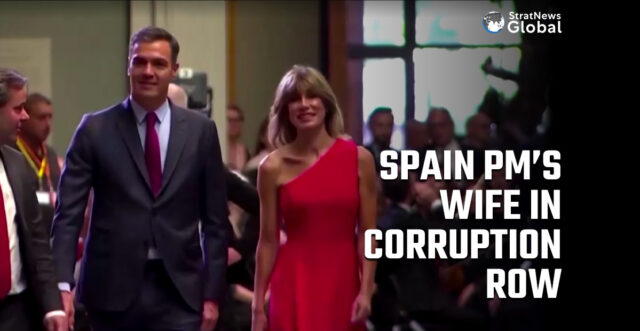Begona Gomez, the wife of Spanish Prime Minister Pedro Sanchez, appeared in a Madrid court on Friday. But she declined to answer questions about corruption and influence peddling accusations in a case that led her husband to consider resigning in April.
Friday’s hearing in Madrid is part of a preliminary investigation into whether Gomez used her position as the premier’s wife to secure sponsors for a university master’s degree course that she ran.
“Our position is … that this process is totally groundless,” her lawyer and former Interior Minister Antonio Camacho told reporters. “My client has not testified not because she has something to hide, but because her attorney recommended her to do so.”
Gomez entered and left the courthouse through the underground parking, avoiding dozens of reporters outside.
She has not commented publicly on the case. But Sanchez has vehemently denied the accusations against her, saying they were baseless and orchestrated by right-wing political foes.
In April, Sanchez took a five-day break from duties to weigh whether to resign after the court opened the investigation. But he ultimately decided to stay on.
The case was brought through a unique Spanish legal instrument, the “people’s accusation”. It allows private individuals to bring criminal complaints against third parties. Judges can choose whether or not to act, and not every accusation has led to a judicial investigation.
The complaint against Gomez was filed by Manos Limpias (Clean Hands), an anti-corruption activist group. Miguel Bernad, a lawyer and politician who has stood as a candidate for a far-right party in European elections, leads it.
Another far-right party, Vox, also joined the plaintiff. Its lawyer, European lawmaker Jorge Buxade, told reporters he will ask the investigating magistrate to call Sanchez to testify.
The investigation seeks to evaluate Gomez’s conduct since Sanchez became prime minister in 2018, the court said. The European prosecutor will probe contracts related to European Union funds separately.
With inputs from Reuters
At six feet and over, cool, calm and always collected. Never a hair out of place. He is the high priest of editorial facts, grammar is his baby and headlines are meat on the bone. Loves samosas and cricket, tracks Twitter and when in his cups, nothing better than Jagjit Singh’s ghazals.





